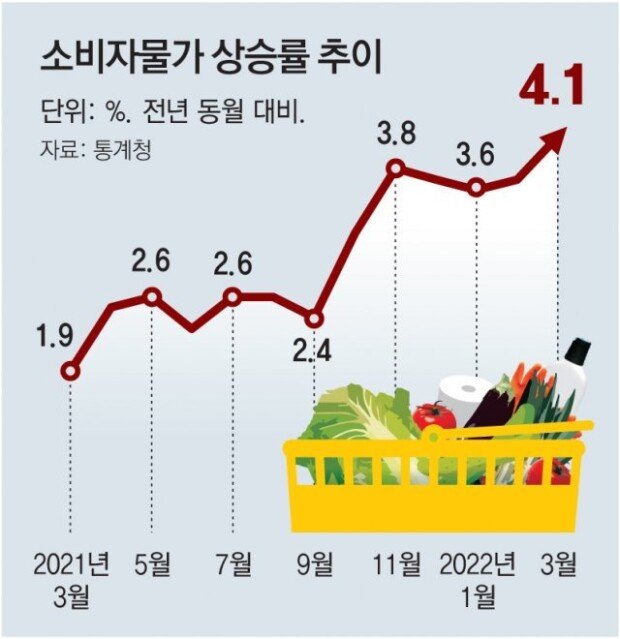Consumer prices rose 4.1% in March alone
Consumer prices rose 4.1% in March alone
Posted April. 06, 2022 08:08,
Updated April. 06, 2022 08:08

Consumer prices grew 4.1% in March, driven by higher raw material prices by Russia’s invasion of Ukraine. Against this backdrop, the South Korean government has also decided to drop fuel taxes up to 30% from May, predicting that price growth will stay high for the time being.
According to consumer price index trends issued by Statistics Korea, consumer prices in March rose by 4.1% compared to the previous month, the highest increase in 10 years and three months since December 2011 (4.2%). Consumer prices rose to 3% range from October last year (3.2%) after sustaining 2% range from April to September last year.
Inflation rate increase of 4% was driven by increase in industrial prices including oil products and personal expenses such as eating out. The price of oil products, in particular, rose 31.2% compared to the same period last year - gasoline (27.4%) and diesel (37.9%). Contribution of oil prices to consumer prices in March (1.32 percentage points) increased by 0.53 percentage points compared to the previous month. The impact comes from higher domestic energy prices driven by international oil prices exceeding 100 U.S. dollars per barrel, affecting industrial products and overall prices.
Individual service prices rose 4.4%. Dining prices rose across all 39 items, totaling increase rate to 6.6%, the highest rise since April 1998 (7.0%). The increase reflects higher prices in raw materials and delivery fees, along recovery in consumer spending.
The government anticipates that high inflation will stay for longer term as the Ukraine situation persists. Higher power prices and heating costs, effective from this month, is expected to add burdens. “We will drop fuel taxes from 20% to 30%, effective from May to July,” said Deputy Prime Minister and Minister of Economy Hong Nam-ki at the vice-ministerial meeting on Tuesday.
Teuk-Gyo Koo kootg@donga.com




![[단독]다주택자 대출연장 규제, 서울 아파트로 제한 검토](https://dimg.donga.com/c/138/175/90/1/wps/NEWS/IMAGE/2026/02/20/133392750.1.jpg)


